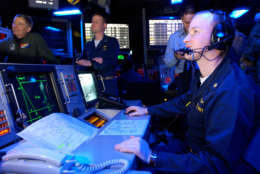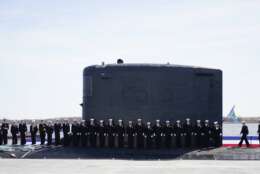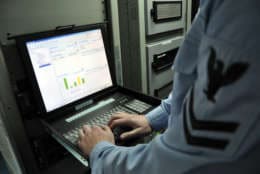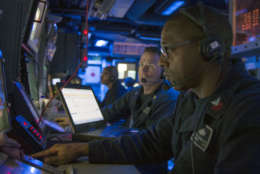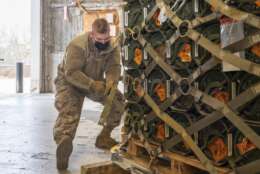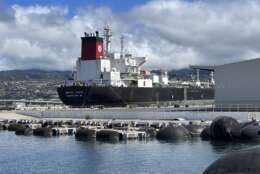Navy
-
Convicted Malaysian defense contractor Leonard Francis who led a daring escape weeks before he was scheduled to be sentenced in 2022 is seeking new defense attorneys now that he is back in U.S. custody after the Venezuelan prisoner swap last month.
January 04, 2024 -
The top Reporter’s Notebooks of 2023 continue to demonstrate the interest and desire for in-depth reporting, digging out more than the tidbits, but the stories behind the news.
January 03, 2024 -
U.S. Indo-Pacific Command says it's starting with a clean sheet of paper on the topic of network defense, building a mission partner network that incorporates zero trust from the beginning.
December 28, 2023 -
In today's Federal Newscast: DoD's Electronic Health Record problems are still a big factor in military recruiting challenges. GAO says the Department of Veterans Affairs is failing to detect drug felons during the hiring process. And the Senate has confirmed the new director of the Defense Intelligence Agency.
December 07, 2023 -
The MITRE Corporation is celebrating the opening of what it says will help numerous federal agencies do a better job of studying national security, climate and environmental issues. The new BlueTech Lab in Bedford, Massachusetts opened its doors to federal agency sponsors last month. It includes a 620,000-gallon tank for testing unmanned surface and undersea systems – the biggest in the region.
December 04, 2023 -
The National Maritime Intelligence-Integration Office coordinates maritime awareness intelligence from a plethora of stakeholders, both domestic and international, and employs cloud services and automation tools to make sense of it all.
November 30, 2023 -
The Navy’s submarine talent pipeline program will help address workforce shortages by working with industry at a time of increased demand for submarines with the United States’ partnership with Australia and the United Kingdom.
November 28, 2023 -
The Department of the Navy says it’s seen some big successes with a pilot program that lets them use a single color of money for software, and wants Congress to expand the authority. But quantifying those successes isn’t easy.
November 03, 2023 -
Alan Hope, head of the mission development branch at the Naval Research Laboratory inside the Naval Center for Space Technology, said the “Maritime mission is a global mission, and as such, that requires access to parts of the globe that aren’t easily accessible by any other means.”
November 02, 2023 -
Chris Cleary, the Department of the Navy’s principal cyber advisor, is most proud of his work around the Navy’s cyberspace superiority vision and work to better protect operational technology.
October 30, 2023 -
The Navy is solidifying the importance of customer experience. For example, its Program Executive Office for Manpower, Logistics and Business Solutions is making its customer experience feedback pilot program permanent in the coming months.
October 27, 2023 -
The Navy sees a not-too-distant future in which sailors aboard ships have the same level of connectivity they have on shore, thanks almost entirely to advances in the commercial sector.
October 27, 2023 -
The Navy’s Program Executive Office Digital (PEO-Digital) turned to the Small Business Innovation Research program for the first time to find, test and hopefully use innovative technologies to continually improve its processes.
October 18, 2023 -
The National Armaments Consortium is a coalition of industry groups, whose members work on the next generation of ordnance and the energetics that power them.
October 16, 2023 -
Next week the U.S. military plans to begin draining fuel from World War II-era underground fuel tanks in Hawaii. Work to drain the 104 million gallons remaining in the tanks is scheduled to begin on Monday.
October 13, 2023





